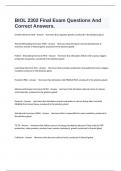BIOL 2302 Final Exam Questions And
Correct Answers.
Growth Hormone (GH) - Answer Hormone that regulates growth, produced in the pituitary gland
Thyroid Stimulating Hormone (TSH) - Answer Hormone that stimulates normal development &
secretory activity of thyroid gland, produced in the pituitary gland
Follicle - Stimulating Hormone (FSH) - Answer Hormone that stimulates follicle cells to grow, triggers
production of gametes, produced in the pituitary gland
Luteinizing Hormone (LH) - Answer Hormone that promotes production of gonadal hormones, triggers
ovulation produced in the pituitary gland
Prolactin (PRL) - Answer Hormone that stimulates milk PRODUCTION, produced in the pituitary gland
Adrenocorticotropic Hormone (ACTH) - Answer Hormone that stimulates adrenal cortex to release
corticosteroids, produced in the pituitary gland
Oxytocin - Answer Hormone that stimulates muscle contraction in uterus during labor and milk
RELEASE from breast tissue, produced in the pituitary gland
Anti-diuretic hormone (ADH) - Answer Hormone that is responsible for water retention, produced in
the pituitary gland
T3/T4 - Answer Hormone that utilizes sources of energy, breakdown glucose & fatty acids for ATP
production, make proteins, produce heat, excrete cholesterol, growth, produced in thyroid gland
Calcitonin - Answer Hormone that decrease calcium levels, produced in thyroid gland
,Parathyroid Hormone (PTH) - Answer Hormone that increases blood calcium levels
Glucagon - Answer Hormone that increases blood glucose levels, secreted by Alpha cells in pancreas
Insulin - Answer Hormone that decrease blood glucose levels, secreted by beta cells in pancreas
Aldosertone - Answer Hormone that increase sodium & water, decrease potassium, produced in
adrenal cortex
Cortisol - Answer Hormone that breakdown skeletal muscle & fat, convert amino acids into glucose,
anti-inflammatory, produced in adrenal cortex
Androgens - Answer Hormone that is responsible for growth, secondary sex characteristics, muscle
development, produced in adrenal cortex
Epinepherine/ Norepinepherine (NE) - Answer Hormone that increases heart rate & respiratory rate,
breakdown glycogen & fatty acids, produced in adrenal medulla
Testosterone - Answer Hormone that stimulates muscle growth, thickening of vocal cords, increased
facial & pubic hair, sperm development, produced in male gonads (testes)
Inhibin - Answer Hormone that inhibits secretion of follicle - stimulating hormone (FSH), produced in
male gonads (testes)
Estrogen/progesterone - Answer Hormone that stimulates body shape, pubic hair growth, breast
development in females, produced in female gonads (ovaries)
Melatonin - Answer Hormone that regulate sleep/wake cycles, produced in pineal gland
Pituitary Dwarfism - Answer Hyposecretion of growth hormone (GH) from the anterior pituitary gland
BEFORE puberty, results in undergrowth of body structures
, Gigantism - Answer Hypersecretion of growth hormone (GH) from the anterior pituitary gland during
childhood, results in excess growth of all body structures
Acromegaly - Answer Hypersecretion of growth hormone (GH) after puberty, over growth of soft tissue
Diabetes insipidus - Answer Hyposecretion of anti-diuretic hormone (ADH) from posterior pituitary
gland, results in excessive thirst, frequent urination and large volumes of urine
Hypothyroidism - Answer Hyposecretion of thyroid hormone
Congenital (primary) hypothyroidism - Answer Hyposecretion of T3/T4, defects of follicular cells, occurs
AT birth, abnormal development & mental retardation if untreated, treated with T4
Myxedema (secondary) hypothyroidism - Answer Hyposecretion of thyroid - stimulating hormone (TSH)
& thyrotropin-releasing hormone (TRH), occurs AFTER birth, leads to puffiness in face, slow heart rate,
sensitivity to hot & cold, muscle weakness
Hashimoto's disease - Answer Hyposecretion of T3/T4, antibodies attack proteins in thyroid, leads to
destruction of gland
Hyperthyroidism - Answer Hypersecretion of T4
Graves disease - Answer Hyperthyroidism disorder, antibodies bind to thyroid - stimulating hormone
(TSH) receptor & overstimulate thyroid by mimicking TSH functions
Hypoparathyroidism - Answer Hyposecretion of parathyroid - stimulating hormone (PTH), caused by
thyroid surgery damage, results in lowered blood calcium levels & nerve/muscle cell function, treated
with calcium & vitamin D supplements
Hypoglycemia - Answer Lower than normal blood glucose levels
Hyperglycemia - Answer Higher than normal blood glucose levels




